The Shocking Truth About Dubai Construction Workers
Before we begin: modern slavery in Dubai is something that I’ve written about before. In my previous article, I gave an overview of the conditions that migrant workers in Dubai have to deal with and why this amounts to modern day slavery before questioning why tourists continue to flock to Dubai despite its shocking human rights violations. If you’re new to the topic of slavery in Dubai then I suggest you check out that article first, before coming back to this one.
Click here to read my article about modern slavery in Dubai.
In this article I will be digging a little deeper and focusing specifically on the treatment of construction workers in Dubai and the shocking abuses they incur. We will also be looking at Dubai workers living conditions, and the ways that Dubai migrant workers suffer at the hands of a legal system that is stacked against them.
Got that? Okay, so let’s begin.
Dubai Construction Workers – The Truth About Migrant Workers in Dubai
Picture Dubai and what do you see? My guess is high rise buildings, luxury resorts and prime real estate. In fact, not only is Dubai home to the world’s only ‘7-star’ hotel, but the tallest as well, and with 168 hotel projects in the pipeline as of 2017, it doesn’t seem to be slowing down any time soon.
However, it hasn’t always been that way. As recently as 1990, Dubai was little more than a desert with its main strip, Sheikh Zayed Road possessing only a couple of buildings with sandy plains stretching as far as the eye can see.


Fast-forward just a few short years and the United Arab Emirates – in particular the Emirate of Dubai – is one of the biggest and fastest growing construction markets in the world, with at least half a million migrant construction workers being employed in Dubai alone.
The Numbers
Dubai Migrant Workers
The United Arab Emirates has a colossal number of migrant workers, with foreigners making up a whopping 88.5% of the total workforce in the UAE – a total of around 8 million people.
In fact, the private sector (the part of the economy which is run by individuals and private companies and is not state controlled) is comprised of 99.5% migrant workers (!), meaning the UAE’s economy depends entirely on the migrant workforce and the value that they provide.
Of these migrant workers in the UAE, 20% of those are construction workers who are overwhelmingly men from South Asian countries (namely India, Pakistan, Bangladesh and Sri Lanka) who are illiterate and from impoverished rural communities.
They come to Dubai in search of a better life after being promised food, accommodation and good salaries* in exchange for 9-5 construction work 5 days a week.

The Process
How Do Construction Workers in Dubai End up as Slaves?
The process of recruiting foreigners as slaves in Dubai is really very similar to that of modern day slavery and human trafficking all around the world.
What is shocking about slavery in Dubai is that the recruiting of slaves is done right out in the open, with the slave owners hiding in plain sight.
First, you create a dream to be sold.
With a city like Dubai, that isn’t hard to do. You simply show glittering panoramic shots of the skyline, dangling the luxury of Dubai on a thread and emphasising the huge salaries and excellent quality of life that is yours to enjoy in this adult playground.
Dubai has marketed itself for years as a cosmopolitan paradise where dreams are made, and so it isn’t difficult to convince a poverty-stricken man from rural Bangladesh who is struggling to feed his family that life in Dubai must be better.
Next, you have to sell that dream.
Agencies in the victims’ home countries advertise the so-called ‘opportunities’ in Dubai and charge the victims 2000-3000 USD to pay for the arrangement of the employment contracts, work visas and travel to Dubai. This practice is illegal (in actuality the employers are responsible for the fees) but the Emirate employers simply pay the agencies to bill the client and the government turns a blind eye.

As the men are already living in poverty, they don’t have this kind of money and so they either take out loans from elsewhere or borrow directly from the unscrupulous agency recruiters, who know exactly what is going to happen to the men once they arrive in the UAE but do not care. This means that the men are in debt as soon as they arrive in the United Arab Emirates.
The next step occurs when the men have arrived in Dubai. Their employers confiscate their passports, a practice that has been illegal since 2002 but is continued nevertheless. Officially, this holding of passports is supposedly for ‘security reasons’ to prevent workers from ‘absconding,’ but in reality it turns them into a prisoner, unable to escape, even in instances of exploitation and abuse.
The final stage in this process is forcing the men to sign contracts, either in Arabic or English (most of these men are illiterate), with terms much different to what they initially agreed on back home. This is also illegal but happens across the board.
By this stage, the Dubai migrant workers are helpless and the employer can treat them as he sees fit.
The Practice
Treatment of Dubai Migrant Workers in Construction
Dubai Workers Living Conditions
The accommodation provided to migrant workers in Dubai is barely habitable.
Located an hour or more outside of the city, these squalid shanty towns or ‘Dubai labour camps’ (as they are known), are fetid hovels with overflowing toilets (I use this term loosely as usually the toilet is just a hole in the floor), no electricity and no air-conditioning or fans in the 50+ degree heat (122 degrees F). Eight to twelve men sleep in a room, often with five or more rooms in the house and one bathroom between everybody.
Although the Dubai Municipality announced some ‘minimum standards’ for labour camps back in 2007 which saw some changes, many of the construction workers in Dubai have not seen any improvement, and the Dubai workers’ living conditions remain atrocious.
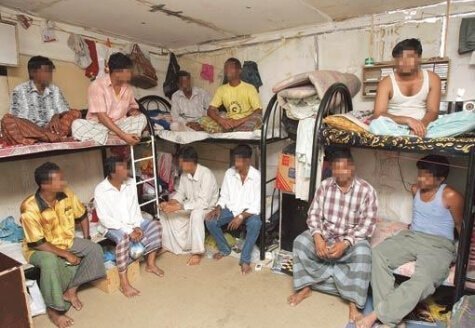

IMGs from The Coverage
Low Wages
One of the biggest complaints made by construction workers in Dubai is that the wages are far less than promised and impossible to live on. I received an email from a Dubai migrant worker who said that he ‘knew a Pakistani roofer who was paid like $2 per hour to work in 50 degree weather exposed completely to the sun. And he worked 12 hour shifts, 7 days a week.’
This figure, amounting to $672 per month if the man was paid for all of the hours that he worked, is actually quite high – the average construction worker in Dubai gets just $175 per month for up to 12 hours a day, 6 or 7 days a week, with some workers being paid as little as $106 per month, or 0.35c per hour.
This is a stark contrast to the average monthly salary of a Western expat, which is $8471 (of course, Western expats are usually working in more skilled jobs but there is no justification for such a huge discrepancy).
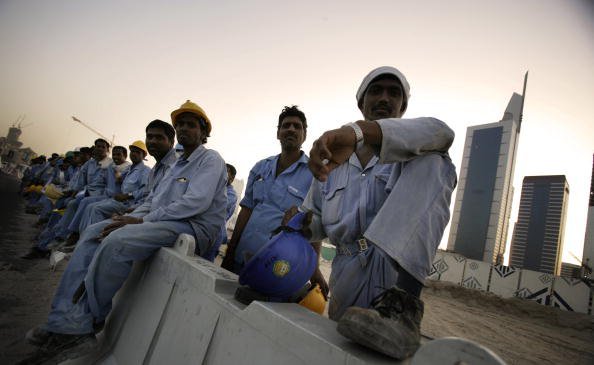
Failure to Pay Wages
As with the confiscation of the passports, not paying workers is ‘custom’ in Dubai, and employers routinely hold the first 2 months wages as ‘security’ to prevent the worker from absconding. However, wages are often withheld for much longer than 2 months, with some Dubai migrant workers not being paid for 6 months, or even a year.
As soon as a workers’ wages are withheld for even 1 month, they immediately fall into arrears on the debt owed to the recruitment agencies back home, incurring interest on the already huge amounts owed. They also cannot send money back home to their families who desperately need it, and in addition to that, they have to borrow even more money from those around them just to be able to buy the food they need in order to survive.
These men, who came to Dubai hoping to improve their financial situation, often end up in a far worse position than they were in back in their home countries.
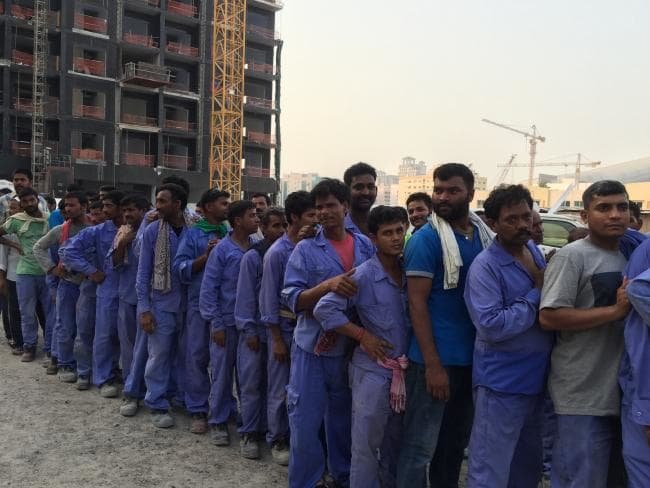
Hazardous Conditions
Perhaps the most troubling thing about the treatment of construction workers in Dubai is the hazardous conditions that they are forced to work in.
As if the Dubai workers’ living conditions weren’t bad enough, these men are exposed to the sun for hours at a time in temperatures exceeding 50 degrees Celsius (122 Fahrenheit).
This is at a time when tourists are warned not to stay outside for longer than 5 minutes.
Although a law was made that limited the hours workers are allowed to spend outside in the summer months, this law is rarely enforced, with many companies openly flouting it and no fines being administered. Thousands of construction workers are admitted to A&E every month during the summertime in Dubai.
It is almost no surprise that conditions on construction sites are so dangerous when we consider the fact that combined with the unforgiving heat, only 18% of construction companies in the Dubai Municipality conduct regular health and safety training, 63% of construction deaths in Dubai occur due to poor supervision and lack of training and 59% of all employees in Dubai are never issued a health and safety certificate.

IMG: Rich Kids of Dubai Instagram
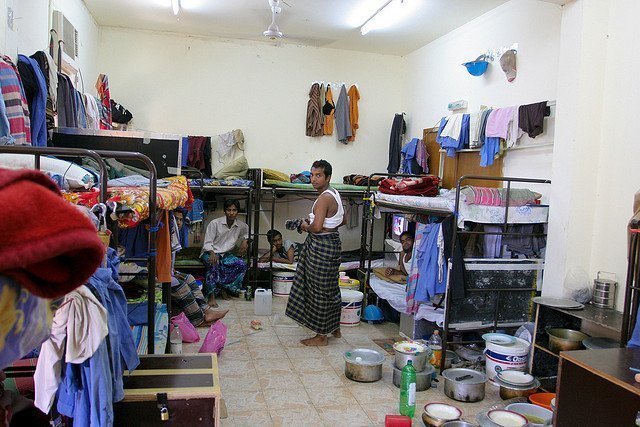
IMG: Arabian Gazette
Deaths of Dubai Migrant Workers
In 2004 alone, the embassies of India, Pakistan and Bangladesh returned the bodies of 880 construction workers back to their own countries (30% of which are thought to be on-site deaths), yet in the same year Dubai claimed that only 34 construction workers had died.
The following year, India reported 971 deaths of Indian nationals in the United Arab Emirates, a number that has not been acknowledged by the UAE itself. With 71% of workers in the UAE having no way of reporting accidents, construction workers in Dubai are almost totally reliant on their employers reporting injuries and deaths to the authorities, something which they are clearly failing to do.
This failure of companies to report the deaths of workers is part of the reason why conditions never improve – after all, if nobody is dying then it can’t be too hazardous, right?
In addition to on-site deaths due to dangerous working conditions, suicide among migrant workers in the UAE is a huge problem. In fact, The Indian Consulate in Dubai revealed that at least 2 Indians commit suicide every week in the UAE, a number that is simultaneously both shocking yet unsurprising.
Of course, suicide is a problem everywhere, being the leading cause of death for men under the age of 50. However, when the people taking their own lives are from the same minority in the same area doing the same type of job, there is something very very wrong.
I wrote more about the topic of the suicides of gulf workers in Gulf states in my article about the Qatar World Cup deaths.

The Law
How does the law enable the exploitation of migrant workers in Dubai?
The Kafala System
Part of what enables slavery in Dubai is the Kafala system.
Kafala, which means ‘sponsorship’ in Arabic, with a sponsor being a kafeel, is a system popular in the Gulf countries that delegates the responsibility and oversight of workers to private citizens and companies as opposed to the government.
The Kafala system not only requires workers to receive permission from their employer if they wish to change jobs, but it also requires a minimum of two years working for the same person or company.
This of course helps enable wage suppression as there is effectively no competition.
The migrant workers’ exit visa is also under the control of the kafeel, meaning that the worker cannot leave the country without their employer’s permission.
This in itself renders the system wide open to abuse and exploitation, with migrant workers in Dubai being at the total mercy of their employers (particularly in the case of vulnerable domestic workers, which I will cover in a later article), but in addition to that, the Kafala system provides no protection for the workers.
The Kafala system does not allow workers to dispute employers’ non-performance of contracts, nor does it allow them to escape a potentially abusive situation.
If a worker is caught trying to escape their employer then they are returned straight back to the same employer, who also has the right to cancel their residency, which would lead to detention and eventual deportation.
All of the above totally strips the worker of their right to choose and puts the employer in the position of ‘slave owner,’ with the worker helpless to change the situation.
The Kafala system is so barbaric that even the official UAE Labour Law website acknowledges that ‘it puts workers in vulnerable situations where they are dependent on their employer, which often leads to exploitation and abuse with little ability to seek outside assistance.’ (I implore you to take note of the use of the word ‘often’ in that sentence.)
In fact, in 2016 the UAE began implementing labour law reforms aimed at ‘eventually abolishing’ the Kafala system but the Human Rights Watch World Report 2019 found that the system continues to trap vulnerable migrant workers in Dubai.

IMG: The Explainer
A Lack of Investigation
Although the UAE Federal Labour Law provisions apply to both UAE nationals and migrant workers, the federal government of the UAE have completely failed to investigate, prosecute and remedy abusive and unlawful conduct by employers towards construction workers in Dubai.
For example, although confiscating passports is illegal, it happens. Although forcing workers to pay for their own work visas and travel costs is illegal, it happens. Working for more than 8 hours a day (totalling 48 hours a week) is illegal but guess what? It happens. Although a minimum wage should have been implemented in 1980, there is still no minimum wage in the United Arab Emirates and no companies have been prosecuted for failing to implement a minimum wage.
Part of the reason for this is that a Human Rights Watch report found that only 140 government inspectors were responsible for overseeing the labour practices of over 240,000 businesses that employ migrant workers. It doesn’t help that there are no independent organisations to monitor the construction sector, document abuse or advocate for human rights.

IMG: Boycott UAE
A Dodgy Appeals Process
While I would like to say that the only reason for the failure to prosecute unlawful employers is a lack of man power in the system (something that can be easily rectified), this is sadly not the case.
My contact in Dubai told me that ‘The Dubai courts system is the main reason there are no labour rights for migrant workers in Dubai.’ The law is designed to protect the interests of employers and large companies at the expense of the worker, and this is apparent when we take a look at the appeals system.
Although workers can legally seek a hearing in front of the Ministry of Labour if they feel as though their rights are being denied, it is not a simple process and government officials (including the Minister of Labour himself) have criticised this system, saying that it is ‘inadequate’ and ‘in need of urgent reform,’ also noting that it ‘protects the interests of construction companies and keeps no comprehensive information or statistics on cases.’
First of all, the migrant worker must make a complaint in writing to the Ministry of Labour, which, considering that the vast majority of South Asian construction workers in Dubai are illiterate and do not speak Arabic, is no easy feat. The worker I spoke to (who was in the middle of his own court case at the time of our correspondence) said ‘The bureaucracy makes it expensive to file a claim. You need to pay top dirham for Arabic translations.’
Of course, when most construction workers in the UAE are paid pitifully small amounts or even denied their wages altogether, this presents another obstacle.
He continued – ‘Cases take forever. This is not an accident, but on purpose to tire employees. In my own assessment it is not worth to go to court in Dubai if you are not seeking more than $30,000. A lawyer will cost at least $3000, and they don’t work on commissions for the most part.’
His comments on how difficult it is to even get a hearing paint a depressing picture, but even those lucky few who do make it to court, there is little hope for justice. In their investigation, the Human Rights Watch did not find a single occurrence of an employer being sanctioned for failing to pay workers, either with prison time or with a financial penalty. Even those workers who do succeed in obtaining a judgement against their employer do not manage to recover their unpaid wages, let alone see any kind of punishment to the guilty party.

The Treatment of Construction Workers in Dubai | Final Thoughts
I think, if you’ve made it this far, then you will find it impossible to deny that Dubai is a city built by slaves that continues to reap the benefits of their hard work while exploiting them more and more.
This is not simply a case of low wages and long hours.
This is not people taking bad jobs in order to put food on the table.
This is slavery, through and through, at an institutionalised level.
Modern slavery in Dubai is perpetuated by privately owned companies in the construction sector and the unscrupulous agencies in the victims’ home countries. It is enabled by a government that doesn’t have the means, nor the desire to put a stop to it. The government of the United Arab Emirates cares nothing for human rights and human life, especially if that human is a poor, unskilled man from a small village in India or Pakistan.
To the government of the UAE, construction workers are not people. They are tools to be used, exploited and disposed of when their bodies inevitably shut down.
I will leave you with the words of my correspondent in Dubai:
‘I have seen many cultures and countries, but only in Dubai have I seen true slavery. In Latin America [the man is from El Salvador] there is poverty and work exploitation, but poor people are better off. Only in Dubai have I seen employers confiscating your passport, not paying workers for 6 months straight, and forcing them to work 12 hours, 7 days a week in the sun outside.’
You May Also Like
I spoke about this issue on a German TRT documentary.
My other articles about human rights in the Middle East can be found here:
Modern Slavery in Dubai
Modern Slavery in Qatar
Dubai Porta Potties
Why Influencers Need to Stop Promoting Saudi Arabia
The Truth About Honour Killings
The Girl Who Escaped ISIS Book Review
Why You Shouldn’t Attend the MDLBEAST Festival in Saudi Arabia
If you like this article and would like to support my work, please click the button above to donate a couple of bucks and buy me a coffee. The revenue that I receive on this website is minimal, so support from my readers enables me to keep creating content that you (hopefully!) love to read.
*compared to what they would receive back home.

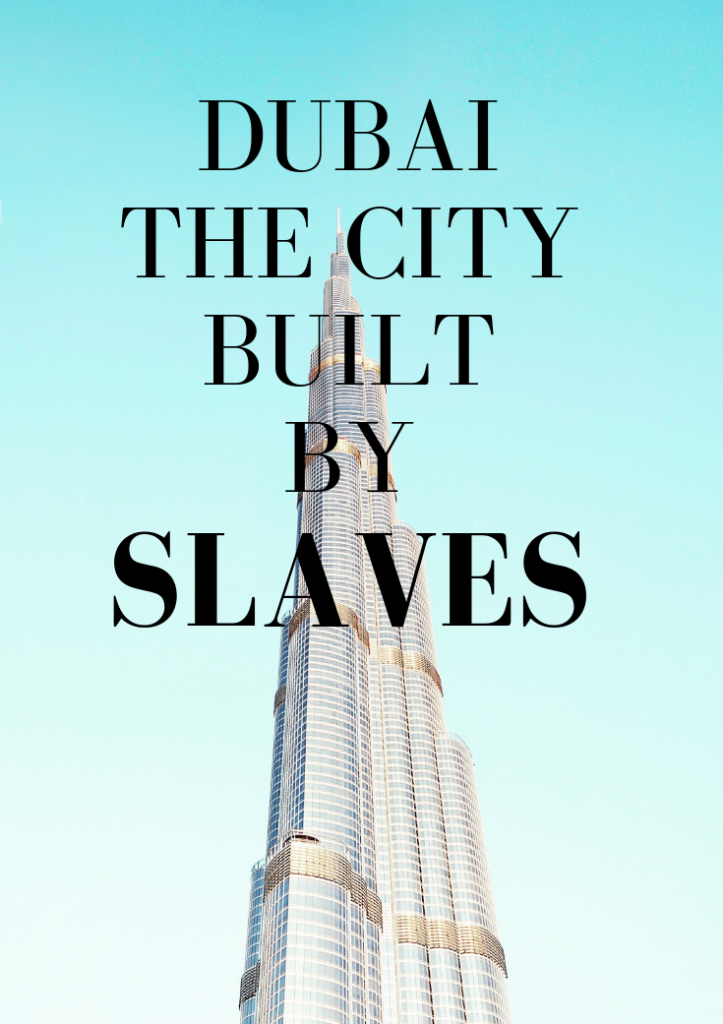

You are absolutely right in all you said…my husband was a victim of this before he took his freedom by force! Thank you for this comprehensive summary! I hope they change!
Oh my gosh, how awful! I’m so glad that he is out now! Do you think that he would be interested in telling me about his experiences in order for people to hear his story?
Many talk about richness of the country in wealth. Richness comes from the culture, how we respect others and how others respect us. Many illegal immigrants destination is not the above countries as they are aware they are going to be slaves of this new country if they end up there. Hence most want to migrate to Europe for better life, where they are treated as fellow human beings.
I think that the men from India, Pakistan, Bangladesh etc. who are working in the UAE intend on living and working there. The loans that they take out and their employment contracts prove this. They are not trying to get into Europe, they have been mislead.
As a man born and raised in Dubai, I haven’t noticed any of this at all. It is all around me and I did notice that most construction workers were South Asian, but I was raised to believe that it was okay. But when I moved to the U.S I have researched more deeply into this and now I know and understand what they are going through, because I used to live next to a construction site in Dubai and the workers would be working everyday no matter what from dusk till midnight. This is insane and needs to be heard by everyone that’s going to visit this cruel country I called home.
Thank you so much for sharing your perspective as someone born in Dubai! I really appreciate it.
How can you not notice it? The busses carrying these workers all have open windows because they have no air conditioning. The workers can be seen all day on construction sites in blistering temperatures. You only need to stroll ten minutes in the CBD to see these exhausted men. How could you not be aware?
Thanks for this important information about the under human conditions that migrant workers are placed in during their contracts in Dubai. I have been approached by a friend in Haiti who wants me to lend him $3,000.00 to pay an agency that will secure flight tickets, accommodation and a construction job on arrival to Dubai.
If Dubai treats South East Asian men in this inhumane way, imagine how they will treat a black Haitian adult orphan. This is a nightmare. Thanks so much for sharing this critical information as it actually can save lives! I will not be part of this “global network of human trafficking under the cover of cheaplabor.”
Oh gosh, please show him this article! I pray he doesn’t go to Dubai, he really will live to regret it 🙁
I’ve been told they also take their passports with promises that the construction companies will start the process for the workers to get their visas. Then of course it never happens. They make promises to pay for flights home once a year, then it never happens. These men work 12-16 hours a day 6 days a week for less than $500 usd a month. If they get sick and miss a day, their pay is docked…if they get paid at all. Its not just Asians either, they do this to Africans as well. Its such a corrupt system.
It’s absolutely awful, and not surprising about the passports at all. Thank you for commenting.
I know many construction company in Dubai and they all do not do this, I think your article investigates some dirty companies, you could do the same in many countries, in all countries are companies/people outlaw…. you can not generalize to all.
I have any benefit telling this, but for sure it is unfair to generalise mixing good with bad companies policies.
By the way, minimum UAE salary is arround 750-800usd
if you believe this is so low, please, check out in their origin countries where their salary is around 30usd a month. For exemple, Ukraine soldiers salary is 150$ a month, and they risk their lives much more.
To be honest, the problem is in their origin country policy, scammers agencies and desperation countries that push population to migrate.
Africa and Asia are very poor, go to origin countries to solve the problem, and not blame the ones (UAE) who helped them to survive and grow.
GREAT WORDS BRO!!!
I’m glad i see your writing.
I’m living in Dubai, and reached here while writing my thesis about ‘The discrimination and occupational segregation in the UAE’.
I knew the part of their insane conditions but your writing shocks me even more with worse things!
it made my heart heavy and definitely gave me more idea to write about to tell the reality to the world.
In my perspective, there are exclusion between Emirati(local) and non-Emirati(Expat). Then, Expat Job sector, position and compensation differs depends on their nationality. Sadly, the UAE neighboring country and South East Asian country migrants sat on the worst position. Kafala law changed lots after the COVID 19 situation, but construction industry seems remain more or less same..
You are totally right. It’s heartbreaking. Thank you so much for your comment, and I wish you all the best in your work!
I like to be used as a slaveboy in dubai as soon as possibly
I can relate to this
I am only 16 and I am living in Dubai
I’m French , and I see everyday these conditions near my house and it’s terrifying
Not only Indians Pakistanis get this also even some European people!
This will teach me a very valuable lesson to never give up my passport for no matter the salary
It’s so sad. Yes, hold onto your passport at all costs.